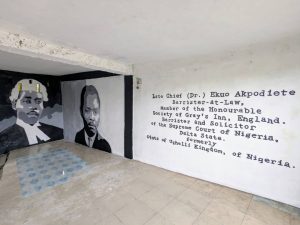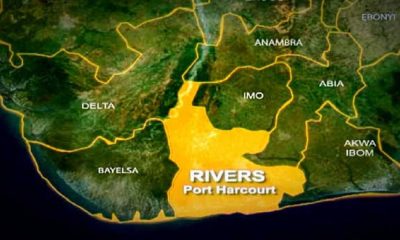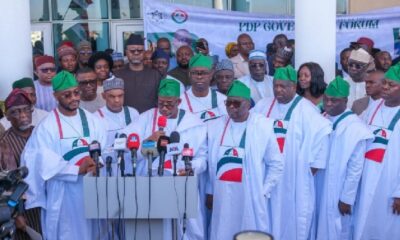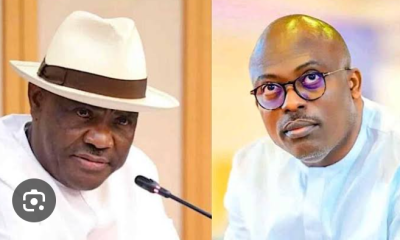Opinion
Google AI funds for Nigerian startups

By Sonny Aragba-Akpore
Sometime last week ,the government of Nigeria in collaboration with Google Africa began what could turn around the fortunes of startups with the launch of One hundred million naira (N100m) fund in Lagos.
The fund, to be overseen by the National Centre for Artificial Intelligence and Robotics (NCAIR), is believed to align with President Bola Ahmed Tinubu’s vision to position Nigeria as a leader in Artificial Intelligence (AI) development.
Communications,Innovation and Digital Economy Minister,Bosun Tijani tweeted on Tuesday,September 10 that “today we launched the N100million Artificial Intelligence Fund in collaboration with @googleafrica aimed at supporting Nigerian startups leveraging AI to build innovative solutions.”
Expected to be managed by NCAIR,the funds will enable startups to deliver cutting edge technologies for developing AI for economic growth.
Although,this initiative looks tempting for the startups,some stakeholders see it as a drop in the ocean.
Despite the misgivings of some stakeholders,government thinks the AI fund is expected to spur technological progress across Africa, empowering entrepreneurs to solve real-world problems through AI.
By providing critical financial and strategic backing, the collaboration sets a new benchmark for digital innovation across the continent, offering African startups a chance to drive economic growth and technological development.
Google’s involvement highlights its commitment to Africa’s digital future according to Olumide Balogun, Google’s West Africa Director, noting that the partnership aligns with Google’s focus on developing Africa-centric solutions and promoting digital innovation on the continent.
“In addition to financial support, the selected startups will gain access to Google’s AI tools, mentorship, and a global network of experts and investors, helping them scale their businesses and expand beyond Nigeria.”
“Eligible startups must be based in Nigeria, have at least one Nigerian founder, and focus on AI-driven solutions with strong market potential. Applications will be open from September 10 to September 25, 2024, with winners announced in October.”
“Tijani explained that the government’s pivotal role in shaping AI policy, which we believe will have long-term effects on both the public and private sectors is a drive in the right direction “.
“If we get it right in the public sector, it will permeate the private sector, transforming national lives and shaping the future of our country,” Tijani stated during the launch.
“The government is also working on a National Artificial Intelligence Strategy to guide future policies and foster AI growth across multiple industries.”
Announced on September 10, 2024, this initiative aims to foster AI innovation and entrepreneurship in Nigeria’s rapidly growing tech ecosystem.
On July 31,2024 Google for Startups Accelerator Africa announced its 8th cohort of 10 startups joining its Africa Accelerator Programme, a three-month virtual initiative designed to help African startups leverage technology to address some of the continent’s most pressing challenges.
Chosen from nearly 1,000 applications, the startups from Ghana, Kenya, Nigeria, South Africa, and Uganda demonstrate the vibrant talent and innovation within Africa’s tech scene.
Google highlighted the crucial role startups play in driving economic growth and technological progress in Africa.
“These startups are not only creating jobs but also improving living standards by developing tailored solutions to local challenges, Google noted, despite the ongoing “funding winter” in Sub-Saharan Africa.
Since its launch in 2018, the Google for Startups Accelerator Africa programme has supported 106 startups across 17 African countries, helping them raise over $263 million and creating more than 2,800 direct jobs, underscoring the programme,s impact on the continent’s tech landscape.
This year’s cohort focuses heavily on artificial intelligence, emphasizing the role of advanced technologies in addressing Africa’s critical challenges.
The N100 million fund is designed to support Nigerian startups leveraging Artificial Intelligence (AI) to develop innovative solutions, and this initiative is part of the broader National AI Strategy published in August, 2024 aimed at integrating AI into various sectors of the Nigerian economy to drive growth and societal well-being.
The AI Fund provides Nigerian startups with the resources they need to develop and scale their AI solutions.
The NCAIR believes that AI has the potential to address local challenges and contribute to Nigeria’s economic growth. By supporting Nigerian startups, the NCAIR hopes to foster homegrown innovation.
Artificial Intelligence has the potential to revolutionize various industries and sectors in Nigeria. From agriculture and healthcare to education and finance, AI can improve efficiency, productivity, and decision-making. By investing in AI, Nigeria can position itself as a leader in the global technology landscape.
In April 2024, the Ministry held the Artificial Intelligence Strategy Workshop bringing together key stakeholders to discuss the future of AI in Nigeria. This was followed by the release of the National AI Intelligence Strategy in August, which outlined the country’s roadmap for integrating AI into various sectors to enhance growth and societal well-being. The AI Fund is a significant step in actualizing these plans, providing Nigerian startups with the necessary resources to innovate and scale their AI solutions.
The AI Fund is open to Nigerian-based startups that are focused on AI-driven technology solutions with the potential for significant impact.
Selected startups will receive up to ₦10 million in funding, along with access to Google’s extensive resources, including AI tools, mentorship, and a global network designed to help them scale their innovations.
When it rose from its 2024 yearly conference last week,the International Standard Organization (ISO) listed a number of issues relating to AI including standards to follow and ethical practices.
“With an ability to synthesize, analyse and act on enormous amounts of data in seconds, artificial intelligence is extremely powerful. As with any powerful technology, it is crucial we implement it responsibly to maximize on its potential while minimizing negative impacts”, ISO wrote.
For example, if trained using unscrutinized data, AI can replicate harmful biases about race, religion, upbringing or other human characteristics. This could be potentially disastrous if embedded in artificial intelligence used in health, recruitment, law or other human-centred applications.
“Another of the key ethical concerns surrounding AI is privacy. With AI systems collecting vast amounts of data from databases worldwide, there is a need to ensure that personal information is protected and used responsibly. For example, facial recognition technology, often used in security systems or social media platforms, raises questions about consent and potential misuse.”
“Ensuring the responsible development of AI is crucial for its safe, trustworthy and ethical advancement. But how can transparency and explainability be addressed in the context of AI?”
At its core, machine learning refers to the ability of a computer system to learn from data without being explicitly programmed. One example is spam filtering in emails. By detecting similar patterns in spam messages, email platforms can learn what messages are useful, and what should be kept out of the inbox.
“So how does machine learning work? It starts with data. Lots of it.
Machine learning algorithms are trained on huge datasets which they learn to analyse to identify patterns, relationships and trends. These patterns can then be used to make predictions or decisions on new, unseen data.”
Opinion
5G,IoT and AI to boost global GDP by 2030

By Sonny Aragba-Akpore
With Mobile technologies and services now generating around 5.8% of global Gross Domestic Product (GDP) a contribution that amounts to about $6.5 trillion of economic value, there are strong projections that by 2030, this figure will rise to almost $11 trillion, or 8.4% of GDP.
Global System of Mobile Communications Association (GSMA) says much of this will be driven by countries around the world increasingly benefiting from the improvements in productivity and efficiency brought about by the increased take-up of mobile services and digital technologies, including 5G, Internet of Things (IoT) and Artificial Intelligence (AI).
The GSMA recently introduced the 5G Connectivity Index to provide insights into 5G performance in 39 markets in order to encourage informed decision-making.
In terms of Economic Impact,
the GSMA emphasizes the economic benefits of mobile technologies and services, including 5G, projecting that they will contribute significantly to GDP growth by 2030.
“The GSMA provides specific reports and analyses on 5G in different regions, such as Sub-Saharan Africa, Asia ,Middle East among others highlighting the progress and challenges of 5G deployment in specific areas.”
In Sub Saharan Africa for instance with particular attention on Nigeria,South Africa,Egypt,Kenya and Botswana among others some measure of progress in deployment has been recorded.
The rollout of 5G has brought immense benefits across multiple industry sectors, particularly those involving internet of things (IoT) and artificial intelligence (AI) applications in which the real-time transfer of data is crucial.
More broadly, the adoption of 5G is expected to accompany increased data use across the globe, with forecasts anticipating mobile data traffic of over 300 exabytes per month by 2030, more than twice the volume consumed in 2024 according to Statista.
And with a third of global population expected to be covered by this fifth generation (5G) networks ,a technology that has defined new ways of communication by 2025 ,GSMA
says the technology has surpassed growth projections of all times.
“5G subscriptions increased by 163 million during the third quarter 2024 to total 2.1 billion. 5G subscriptions reached close to 2.3 billion by the end of 2024 accounting for more than 25 percent of all global mobile subscriptions.
“4G subscriptions continue to decline as subscribers migrate to 5G” according to GSMA.
As of the first quarter of 2024, there were nearly two billion 5G connections worldwide, with 185 million new additions. This is expected to grow to 7.7 billion by 2028.”
Statistics show that 5G is the fastest-growing mobile broadband technology, reaching 1.5 billion connections by the end of 2023.
It only took four years to reach this number, compared to 10 years for 3G and more than five years for 4G.
“5G is more than a new generation of technologies; it denotes a new era in which connectivity will become increasingly fluid and flexible.5G Networks will adapt to applications and performance will be tailored precisely to the needs of the user” GSMA submits.
By covering one-third of the world’s population , impact on the mobile industry and its customers will be profound according to GSMA.
To deepen the spread of 5G ,GSMA is working closely with the mobile operators pioneering 5G, “by engaging with governments, vertical industries including automotive, financial services, healthcare providers, transport operators, utilities and other industry sectors to develop business cases for 5G.”
And In order to accelerate the growth and spread, many operators are said to be deploying
AI technology as part of an integral part of telecoms operators’ strategic and operational plans.
“Operators are making important advancements in the deployment of AI technology, which is serving as a transformative force shaping the telecoms industry. By deploying autonomous AI-based systems, operators can enhance operational efficiency, customer satisfaction and security, while also creating new revenue opportunities”.
China, South Korea, the United Kingdom, Germany, and the United States are the leading countries with robust 5G coverage in the world.
Since the first commercial launches of the fifth generation of mobile networks in late 2018, these five countries have emerged as leaders because multiple companies in these countries have deployed networks and are selling compatible devices. Countries including Switzerland and Finland are up and comers in 5G development, though they have limited deployment.
In China there are three Companies leading in deployment.
The world’s largest 5G network was launched by the three largest Chinese network operators Oct 31, 2019, according to the state-run news agency Xinhua. These are China Mobile, China Unicom, and China Telecom which all activated their networks in less than five months after they were issued 5G licenses.
Each of the network operators offered their 5G services at $18 per month in 50 Chinese cities at the beginning of the launch.
GSMA expects 36% of China’s mobile users to be using 5G by 2025. That’s about 600 million subscribers, who would also make up 40% of the entire global 5G market by this year.
This is all despite efforts made by the United States government to hamper the progress of Chinese vendors, though those efforts may affect how Chinese companies may expand into the global market.
In South Korea,SK Telecom and Korea Telecom run as the main competitors for the South Korean 5G market.
SK Telecom acquired spectrum in the 3.5 GHz and 28 GHz frequencies to prepare for deploying 5G.
In April of 2019, the Enterprise claimed to be the first mobile carrier in the world to launch 5G services to work on 5G smartphones. SK Telecom asserted an edge over rival Verizon, as the former launched 5G services available at the same time as Samsung Galaxy S10 5G smartphone launched in South Korea. Verizon launched mobile 5G services in the U.S. before a 5G enabled smartphone was available to U.S. consumers.
SK Telecom also conducted tests with a 5G Standalone (SA) Core (a core not reliant on the 4G network) for their 5G network in cooperation with Samsung Electronics.
The world’s largest 5G network was launched by the three largest Chinese network operators Oct 31, 2019, according to the state-run news agency Xinhua. These are China Mobile, China Unicom, and China Telecom which all activated their networks in less than five months after they were issued 5G licenses. Each of the network operators offered their 5G services at $18 per month in 50 Chinese cities at the beginning of the launch.
“What we are seeing is a concerted effort by the Chinese — the operators, vendors, and government regulators — to deploy 5G as quickly as possible,” Chris Nicoll, principal analyst at ACG Research, pointed this out in a November 1, 2019 SDxCentral article.
With all of these players working together, the three network operators had collectively deployed nearly 86,000 5G base stations peaked over 130,000 by the end of 2019. The latter number breaks down into China Unicom and China telecom, with each planning to install 40,000 base stations, and the market leader China Mobile to install 50,000.This was the projection by 2019 but they have since overshot this by the beginning of 2024.
The International Telecommunication Union (ITU), says 5G coverage reached 40% of the world’s population in 2023 with an uneven coverage and distribution with developed countries having more coverage than low-income countries:
In Europe ,68% of the population is covered and
Americas had 59% of the population covered while
Asia-Pacific has 42% of the population covered as at 2023.
Arab States have 12% of the population covered.
Commonwealth Independent of States (CIS) had 8% of the population covered.
ITU figures show Africa,s coverage rose to 10 % of the population by 2023 .
The ITU also notes that 90% of the world’s population is covered by 4G, but 55% of people without access to 4G live in low-income countries because In low-income countries, 3G is often the only technology available to connect to the Internet.
The ITU develops and adopts international regulations and global standards to enable the harmonization and implementation of broadband mobile networks.
In Africa, around a dozen nations have launched services including Botswana, Kenya, Mauritius, Madagascar, Nigeria, Seychelles, South Africa, Tanzania, Togo, Zimbabwe, and Zambia but Africa is a patchwork of 54 countries.
And penetration is predicted to be slow.
By 2027, Ericsson predicts that 80 percent of phone users in Europe will have 5G service.
At the same time, 5G subscriptions in Africa, home to 1.4 billion people, May stagnate at a little over 10 percent. Why will so few people in Africa get access to 5G services?
China, South Korea, the United Kingdom, Germany, and the United States remain the leading countries with robust 5G coverage in the world.
While many countries are already providing robust services,Africa remains on the outskirts of 5G services.
The countries in Africa that have launched 5G networks, include South Africa with its roll out
In March 2022, when the Independent Communications Authority of South Africa (ICASA) sold spectrum across several bands.
In Nigeria,MTN rolled out commercial 5G services in Lagos in 2022, with other roll out in Abuja, Port Harcourt, Ibadan, Kano, Owerri, and Maiduguri among others.
MTN Congo announced that it was the first country in Central Africa to deploy 5G.
In Botswana Orange deployed 5G technology to provide new services in the Gaborone and Francistown regions.
Other countries in Africa that have launched 5G Fixed Wireless Access (FWA) services include: Angola, Kenya, Zambia, and Zimbabwe.
Analysts say “5G’s potential is growing due to its ability to deliver fiber-like speeds. However, there are still challenges in the region, such as:
Urban areas are reaching their maximum capacity whereas a large portion of the population lives in rural areas.
This explains why 5G adoption in the sub-Saharan region is currently below six percent “
Analysts report that 5G deployment in Africa faces many challenges, including Spectrum assignment,regulatory issues,infrastructure,security,financial resources among others.
“Spectrum is a limited resource that is already in use by other services, such as TV broadcasters and satellite operators. Governments need to open up frequencies and grant 5G licenses at reasonable prices. “
Infrastructure is another major challenge.
“5G networks require a large initial investment, including expensive devices, antennas, and Radio Access Network (RAN) hardware. The infrastructure needs to be fiberized to support 5G services.
Regulatory conditions also serve as challenges to deployment.
For instance “regulatory authorities may not have started the process for licensing and granting frequencies in the right portion “
“Most of the equipment and devices required for 5G deployment need to be imported.”
There are also security challenges that make
5G technology vulnerable to cyber security threats, such as tracking calls and exposing user locations.
Opinion
Right of Reply: THE PUNCH AND BUSYBODY BUSINESS

The recent declaration of a State of Emergency in Rivers State has triggered diverse commentaries from a wide range of Nigerians.
Almost everyone hailed the presidential proclamation because of the visible threat to law and order in the state at the time the action was taken. Of course, there were a few naysayers who read political meanings into an otherwise sincere and prompt intervention.
One such negative interpretation is the position taken by the Editorial Board of The Punch newspaper. In one of its editorials published on the matter, the national daily claimed that the entire crisis was caused by what it described as “the needless meddlesomeness in the governance of the state by its former governor and Tinubu’s Federal Capital Territory Minister, Nyesom Wike….” It is unfortunate that this narrative and others like it have become commonplace in the media space.
How did the Editorial Board of a reputable newspaper arrive at such a conclusion? Their claim that the Sole Administrator, Admiral Ibok Ete Ibas (rtd), has been acting a script purportedly written by the Minister of the Federal Capital Territory, Nyesom Wike, is also faulty and has no iota of truth.
They also faulted the sacking of all political appointees who served in Governor Siminalayi Fubara’s administration, insinuating that their replacements were drawn from Wike’s political camp. Again, nothing can be further from the truth.
Since his appointment as the Sole Administrator of Rivers State, Admiral Ibok Ete Ibas has been running the state with the abundant human resources available in the state and has not imported anybody from outside the state. Did the Editors of The Punch really expect him to run the administration with the politicians loyal to the suspended governor?
Do they not know that the crop of political appointees who served Fubara would have found it difficult to work with the Sole Administrator?
Certainly, they know the truth, but they have chosen to stoke the fire to generate more tensions in Rivers State.
Certain interests might have commissioned this editorial to cast aspersions on the Sole Administrator and raise doubts about his capacity to run the state.
It may also have been the handiwork of Wike’s political detractors, the man whom many politicians love to hate for no other reason than envy and jealousy.
We urge the Punch newspapers to seek a better mode of intervention in the political situation and not dwell on innuendos and unsubstantiated allegations against certain political actors in order to blackmail them.
Dr Ike Odogwu
Opinion
“Chief. Dr. Ekuogbe Akpodiete; A Philanthropist, Lawyer, and Statesman”


In a life of achievement, Chief Ekuogbe Akpodiete popularly called the Duke by his contemporaries in the UK was an assessment clerk, post office clerk, a court interpreter, an educationist, a business man, a political party chieftain, a Barrister and Solicitor, a Magistrate, the Otota (the Prime Minister) of Ughelli kingdom which is the highest traditional chieftaincy office that underpin the royal office of the Ovie of Ughelli Kingdom.
He was a trail blazer, a strict disciplinarian, a lover of people, and a philantropist. He saw to it that people lived in peace and happiness.
Born on the 4th of April, 1924, to parents cut from an industrious mould, Chief Ekuogbe Rowland Gregory Akpodiete took zealously to education that neither his mother Ughweriaka who was a trader, nor his father Akpodiete who was a farmer had.
He attended the Native Authority Primary School, Ughelli, and Enitona High School, Port Harcourt, for his secondary school education.
He thereafter had a brief teaching career in primary schools in Ofuoma near Ughelli, he worked as a process clerk in the then Sapele Township Department between 1950 and 1953, serving at the same time as an interpreter in the local courts.
He proceeded to the United Kingdom to seek the proverbial Golden Fleece where he worked and paid his way through, studying Law. He was admitted into the Honourable society of Gray’s Inn, England, in 1965, and shortly after, he returned home to Nigeria and attended the Nigerian Law School. He was called to the Nigerian Bar in 1966. He immediately started practice in Lagos. However, his practice in Lagos was regrettably abridged by the Nigerian Civil War, which drove him to his hometown Ughelli in 1967, where he continued to practise among his kith and kin as the first Legal Practitioner.
Chief Ekuogbe Akpodiete established himself in Ughelli. After the civil war, he served in the now defunct Mid-western State Judiciary from 1972 to 1975 as a Magistrate.
He was conferred with the chieftaincy title of Urhukperovie of Ughelli kingdom (the light of the King) by the then reigning Ovie of Ughelli, His Royal Highness Oharisi II of blessed memory in 1977.
In the quest for more knowledge, he went back to England for his Master’s degree in law (LL.M) and later a Ph.D. at the University of Warwick.
He was awarded an honourary doctorate degree (Ph.D) by Tenesse Christian University from the United States of America in 1991.
He became the Otota (the Prime Minister) of Ughelli Kingdom in 1986, an office he occupied until his demise on 9th April 1995.
Chief Ekuogbe Akpodiete was also politically involved. In the heady days of the Awolowo-led Unity Party of Nigeria, he was the party’s legal adviser in Ughelli and was on hand to assist during Chief Obafemi Awolowo’s campaign hosting in Ughelli and its environs.
In view of his love for people and entertainment, he established a popular cinema house, one of the first in Ughelli, known as REGA cinema, coined from his names, alongside an entertainment place called Unutakunu (people talk to people).
Chief Ekuogbe Akpodiete was blessed with wives and many children, grandchildren, and great grand children.
Mr. Olotu Akpodiete, PhD
Executive Director
Olotu & Ekuogbe Rowland Akpodiete foundation
-

 News23 hours ago
News23 hours agoEmergency Rule: Punch Editorial went overboard – CRP
-

 News11 hours ago
News11 hours agoPDP governors declare support for Tinubu
-

 News14 hours ago
News14 hours agoEx-finance minister rearrested in new fraud probe
-

 News12 hours ago
News12 hours agoHope for Nigerians as Dangote refinery slashes petrol price again
-

 News22 hours ago
News22 hours agoJust in: Rivers Administrator summons, suspended Gov, deputy
-

 News22 hours ago
News22 hours agoCBEX Staff Arrested After Trading Platform Collapse
-

 News14 hours ago
News14 hours agoFubara: How can I forgive somebody who never requested for it– Wike
-

 News16 hours ago
News16 hours agoAlleged Se3ual Harassment: Natasha Declines Out-Of-Court Settlement Proposal By Akpabio’s Counsel






